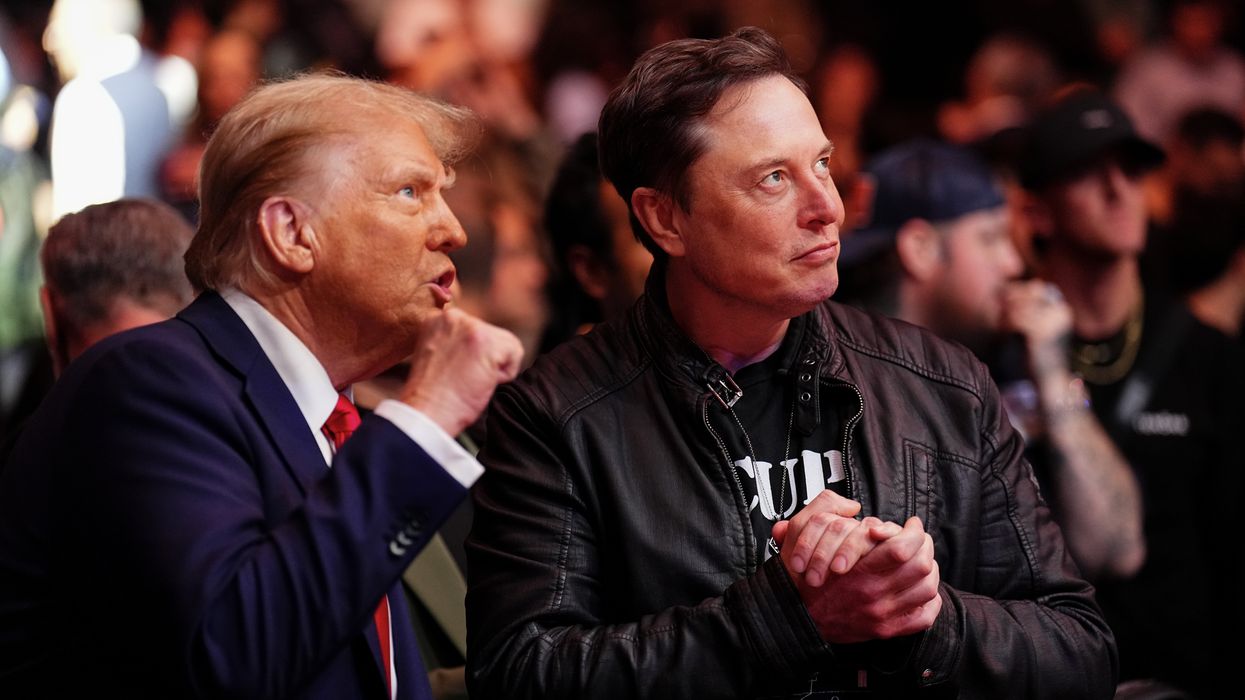Watching the year-end budget fights in Congress as we await the second term of President-elect Donald Trump, I find myself wondering: Will this era be remembered as the time when Trump was president and Elon Musk ran the country?
Trump earned such nicknames as “Captain Chaos” and worse for his unpredictable, constantly changing and easily distracted approach to governing. But close observers of Trump’s political ups and downs understand a key to understanding the chaos: his mountainous self-regard.
Like Glenn Close’s character in "Fatal Attraction," the 45th and soon to be 47th president is not going to be ignored. The corporate class has gotten wise to this, which explains the procession of tech CEOs, founders, venture capitalists and other "broligarchs" who have filed through Mar-a-Lago in recent weeks to flatter and supplicate Trump.
So far it seems to have worked. "EVERYBODY WANTS TO BE MY FRIEND!!!" Trump squealed on Truth Social, his social media platform.
President-elect Trump hasn’t been sworn in yet but he’s already pushing the buttons and pulling the levers of power in his old, familiar style of upheaval, veiled threats and name-calling. But now in the run-up to his inauguration, Trump finds himself competing for headlines with another champion grandstander, the world’s wealthiest human, Elon Musk.
Musk famously spent a quarter-billion dollars this year to get Trump elected, and lately he’s been swanning around Mar-a-Lago like he co-owns the place. He’s been on hand, reportedly, to welcome Trump’s tech-world dinner guests, including his space-biz nemesis, Jeff Bezos.
Musk, whom Trump has tapped to be the co-leader of the so-called Department of Government Efficiency (DOGE), which is not going to be an actual government department but rather a presidential advisory commission, has used his social media network X, formerly Twitter, to exert his new political powers.
We could see the apparent beginning of a new regime of attention grabbing in Musk’s tweetstorm Wednesday criticizing the proposed congressional spending measure unveiled by House Republicans this week.
Denouncing the more-than-1,500-page measure as a big “piece of pork,” he called on the Grand Old Party’s lawmakers to oppose it.
“Stop the steal of your taxpayer dollars!” read one post. “This bill is criminal," read another.
He also declared that any lawmaker who voted for the bill “deserves to be voted out in 2 years!” In other words, any Republican who defies Trump’s wishes can expect Musk to use his money to primary them.
It’s been something to see, this co-presidency that hasn’t even taken office yet. It was aptly summed up in a Bloomberg headline on Thursday: "Trump, Musk Threaten U.S. Shutdown and Republican Party Revamp."
Balanced budgets are easy to demand when you don’t have much of any real obligation to come up with remedies and “pay-fors,” as lawmakers say when they want to know how you pay for your legislative dreams
At stake as the clock ticks toward a new year and new bills to pay, is another “stopgap” spending plan. That’s a temporary solution to funding gaps to keep funds flowing to cover the government’s operating costs into early next year, long after House Republicans elect a new speaker and President-elect Trump is sworn in.
But, as often happens, by the time lawmakers laid eyes on the measure Tuesday, cost-conscious Republicans, in particular, ridiculed it as a true “Christmas tree,” hung with proposals as varied as foreign investment restrictions, new health care policies and, a local District of Columbia favorite, a new stadium site for the Washington Commanders.
The bill included $100 billion in disaster aid funding, billions in farm assistance and dozens of other side deals that pushed the final product past 1,500 pages.
All of which was greeted by Musk’s more than 100 tweets, which also contained a notable number of misleading or outright false claims of the sort that keep fact-checkers busy.
Sarcastic talk of “President Musk” began to bubble up in the ranks of both parties Wednesday, followed Thursday by frustrated budget hawk Sen. Rand Paul of Kentucky, who took a different tack, suggesting Musk as speaker of the house.
If Trump was feeling upstaged, he didn’t say so. He focused his energies against the legislation, calling for it to be dismissed and proposing Congress pass a clean continuing resolution with a debt ceiling increase.
But after that proposal was rejected Thursday night, congressional leaders set to work on a “Plan C” — with less than 24 hours to go to avoid a shutdown. Again, the new effort didn’t have much in the way of pay-fors.
The sorry affair shows the limits of Musk-enabled Trumpism. With dozens of dashed-off posts, Musk made the telephones ring off the hook in many Republican representatives’ offices, demonstrating the awesome new political and media power he’s garnered in the two years since he completed his takeover of Twitter. But neither he nor Trump had any real guidance to offer on how lawmakers from both parties could compromise and write a bill that would keep the government running.
Is this a foretaste of the next four years?
Already I am feeling what Yogi Berra called “Deja vu all over again.” Chaos is making a comeback, the product of an age in which it is increasingly tough to tell illusions from reality. That’s always been part of politics, certainly, but it’s getting a viral boost from our newest digital press baron.
Page is an American journalist, syndicated columnist and senior member of the Chicago Tribune editorial board.
©2024 Tribune Content Agency. Distributed by Tribune Content Agency, LLC.



















